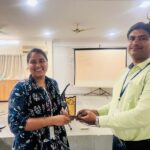An industrial visit to the JINDAL SWM (Solid Waste Management) Plant in Visakhapatnam would involve observing the processes used for managing and treating municipal solid waste. The visit would likely include seeing waste collection and transportation, sorting and processing facilities, and potentially waste-to-energy or composting operations, depending on the specific technologies utilized by the plant.
Here’s a more detailed look at what such a visit might entail:
1. Waste Collection and Transportation:
- Observing the methods used to collect waste from residential and commercial areas, including the types of vehicles and equipment used.
- Understanding the routes and logistics of waste transportation to the plant.
2. Sorting and Processing:
- Seeing how waste is sorted and separated into different categories, such as recyclable materials, compostable materials, and residual waste.
- Observing the use of automated sorting equipment and manual labor.
- Understanding the processes used to prepare waste for further treatment, such as shredding and compaction.
3. Waste-to-Energy (if applicable):
- Observing the process of converting waste into energy, such as through incineration or anaerobic digestion.
- Understanding the technologies used to generate electricity or heat from waste.
- Seeing the equipment used for air pollution control and other environmental safeguards.





4. Composting (if applicable):
- Observing the composting process, which involves breaking down organic waste into a soil amendment.
- Understanding the factors that affect composting, such as temperature, moisture, and aeration.
5. Landfill (if applicable):
- Seeing the landfill, which is the final disposal site for non-recyclable and non-compostable waste.
- Understanding the environmental regulations and engineering practices used to manage landfills.
6. Environmental Management:
- Observing the measures taken to minimize environmental impact, such as air and water pollution control, noise reduction, and waste water treatment.
- Understanding the role of waste management in promoting sustainable development.
7. Educational Aspects:
- Engaging in discussions with plant personnel to learn about the challenges and opportunities in solid waste management.
- Understanding the role of technology and innovation in addressing the growing problem of solid waste.
Conclusion:
By observing these processes and engaging in discussions, students and visitors can gain a better understanding of the practical aspects of solid waste management and its importance in protecting the environment.
Strength of students: 20
Faculty members: 4
Duration:The duration of the industrial tour is one day i.e 11/04/2025.





0 Comments